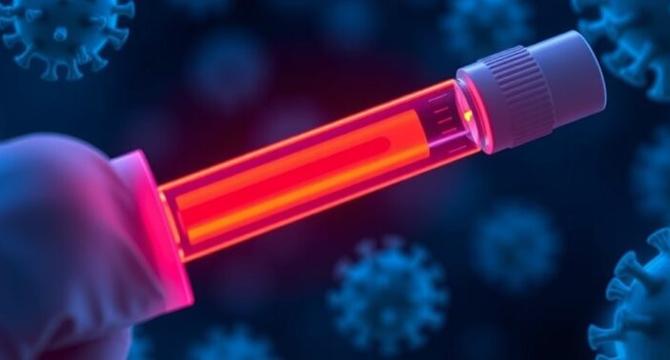Bioengineer
1d
241

Image Credit: Bioengineer
Revolutionary Ultrasensitive Test Tracks Intact Virus Levels in COVID-19 Patients Over Time
- Researchers from Mass General Brigham have repurposed a technology designed for cancer detection to develop a revolutionary diagnostic tool for detecting and monitoring SARS-CoV-2 viral particles present in biological fluids.
- Their technique can detect as few as three intact viral particles in just one milliliter of blood, a sensitivity unparalleled in viral detection methodologies.
- The research consisted of rigorous testing utilizing more than 150 samples from COVID-19 patients, including plasma, saliva, and stool samples.
- Serial monitoring of viral loads is key, allowing for the possibility of tailoring patient treatment plans based on real-time data regarding viral presence and load, which is crucial for effectively managing COVID-19 and its long-term effects.
- This technology emphasizes the necessity for dynamic monitoring solutions in medicine, particularly as infectious diseases become increasingly prevalent and varied.
- The study underlines the collaborative spirit necessary in contemporary research endeavors, where a wide array of professionals contribute integrating insights and methodologies that cut across different scientific disciplines.
- Mass General Brigham has taken proactive steps to protect the breakthrough by filing a US Patent application related to the isolation of SARS-CoV-2 using their novel microfluidic methodology.
- The research findings have far-reaching implications not only for the management of COVID-19 but also for future infectious disease monitoring, enhancing our capabilities to combat viral threats.
- This research marks an exciting fusion of engineering and clinical medicine, showcasing the potentials harbored at the intersection of these fields.
- The collaborative efforts of interdisciplinary experts and significant financial support from various national research institutions and grants have been instrumental in setting a benchmark to develop more effective treatment protocols for patients with COVID-19 and similar future viral outbreaks.
Read Full Article
14 Likes
For uninterrupted reading, download the app